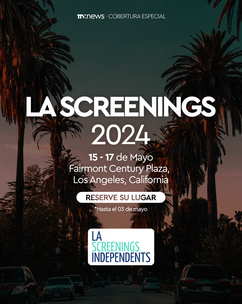The fifth day of the event organized by TTV Media was dedicated, on the one hand, to deciphering the future of the Turkish boom, with leading executives from Eccho Rights, ATV, Madd and Calinos, and, on the other, to reviewing the scripted and unscripted titles that set trends in 2020.
This Tuesday, December 15, TTV+Live: The Future of TV Content, the event organized by TTV Media to accompany the launch of its new B2B platform, continued with two panels: one that looked ahead to anticipate Turkey’s next big hit. and another who looked back on what 2020 left behind.
Titled Turkish new Generation, What Now?, the panel featured Fredrik af Malmborg, Managing Director of Eccho Rights; Muge Akar, Content Sales Deputy Manager at ATV; Ates Ince, Managing Director of MADD; and José Luis Gascue, EVP & Head Worldwide Sales at Calinos Entertainment.
On a year that has been notable positive for Turkish content in the international market, a country where it certainly shone particularly bright was Spain, bolstered by the incredible premiere of Turkish drama Woman on broadcast TV.
“It’s now been almost three years ago that Fatmagul was launched on Nova, scoring incredibly well. And since then I believe we are almost sold out in Spain”, Fredrik af Malmborg began. “A game changer was this summer when Woman premiered on Atresmedia, scoring 2 million viewers on a main channel every day. It’s been incredibly encouraging.”
“I don’t know if it was the pandemic that led to so much viewership or maybe the lack of other productions, but it performs almost better than anything else. I’m not surprised, because the quality is really good”, he added.
“The most interesting thing was that during this pandemic, because of a lack in production, they bet on a Turkish series and it was Woman, which was a proven success in many other countries,” continued José Luis Gascue. “The acceptance from Spanish viewers was tremendous and we can’t be happier.”
“I believe some countries in the region will be following soon, such as Portugal or France, but we haven’t yet defined exactly what the route is going to be. It is making noise all over and it’s an excellent product. We believe it will expand in the short-term”, he added.
Ates Ince is also excited about the future of Turkish content in Spain, revealed that broadcast networks in the country “have acquired two more titles from Madd”, which can’t be announced yet. “They experimented with Woman and will continue to do so”.
But Spain hasn’t been the only international market looking to Turkish content for guaranteed success, something that, as explained by the Madd executive, is taken into consideration by Turkish producers when it comes to planning out their series and productions.
“I’ve worked for 20 years in the industry on the broadcasters side, and I know 70% or 80% of local production aims to have international monetization,” he explained.
“What is unique about Turkey is that it’s very representative of what is working in the world,” af Malmborg added. “If a show doesn’t work in Turkey, it gets canceled, but if it does work in Turkey, it tends to work very well internationally as well.”
This is why the results obtained by shows in Turkey are one of the first things buyers look at when shopping for new series. “I think the performance in Turkey is the first thing international buyers look at,” Gascue said. “However, there are some products that are very very local, that work well too. The good programmers in Latin America and Europe, as well as MENA, can identify what a good product is and which ones would work for their audiences. Networks identified Woman right away. Once you get the local performance, it increases chances of sales. And some networks still bet on products just because they believe in them.”
Other than traditional dramas, which continue to work very well both in Turkey and the global market, the executives agree that there’s now room for other genres to take center stage, given audiences’ increased appetite for content.
“This year has shown that traditional dramas are always on demand, but we also think melodramas and light drama series, or historical content, has also been on demand a lot,” said Muge Akar. “So apart from the romantic, traditional Turkish drama, we see opportunities for other types of series as well. There will be a differentiation in terms of our series offer with other types of content.”
“I think of course we can’t disregard that the market is going through a big change. Over the last few weeks, platforms in Latin America, want to buy Turkish content but it’s not ideal to have over 100 episodes. So we are seeing shorter series 30,40,50 episodes, that we can sell internationally. Turkish drama is aimed at linear TV while shorter content is more aimed at SVOD,” the Eccho Rights executive added.
“We are actually making good progress with Korean series, we have a package of Korean series that we will be marketing to clients in Latin America following the success of Parasite from our mother company CJ E&M. It’s a growing genre. And there’s also a growing appetite for Russian series. We’ve sold some in Spain and we have others coming up,” he added.
As an example of new types of content, Ates Ince highlighted the new romantic comedy Love is in The Air, which he described as “more modern”, because “it’s more like a rom-com, but as comedy doesn’t work internationally usually, the comedy side is small”.
“It’s lighter and serves a younger audience, and we see it’s working. This is the first time a romantic drama like this one will be in Latin America in many countries and I’m sure lots of producers next year will be thinking of doing productions like this one”, he anticipated.
The executives also highlighted a trend of Western themes and plots making their way into Turkish dramas, such as the adaptation of Good Doctor or Doctor Foster, or the new psychological drama, The Red Room.
Another major trend the executives mentioned is the rise in co-production and local production, especially at a time like this when international travel is more difficult. “I think local adaptations and international coproductions are a trend,” said José Luis Gascue. “We have a couple of products we are working with. We are working with one main station in the US for the development of one of our products. I think it’s going to be a breakthrough, because a Turkish title will reach a TV network in the US and it will look very different. So mostly productions and local adaptations from Turkish books will start working very well.”
Ates Ince added that his company is also working on new coproductions, especially following the success of El asesino del olvido, developed with Viacom International Studios. “We are now planning the second one with them”, he said. “We love to work on coproductions with our Latin American friends. We have a couple of series on paper to start working on with clients like Viacom and others, to coproduce together. Our production partner, Ay Yapim and Medyapim, would love to invest in coproductions.”
Slightly less optimistic about the potential of Turkish-LatAm coproductions, af Malmborg noted that the differences in production models between the region make it harder for them to get made. “Everyone has been pushing co-productions between LatAm and Turkey, but since the way of producing is very different between the territories, I don’t of many examples that are working now. We also need to shorten the window between when a series premieres in Turkey and then in other regions, because after the pandemic, that’s not how the world works anymore.”
Lastly, the executives shared their experiences working during the global pandemic, and how it has affected their business models and strategies.
“When the pandemic started in March we had to stop our production,” said Muje Akar, “but thankfully in the summer the numbers began going down and we were able to start most of our productions, of course with all the necessary safety measures and daily tests, among other things. Right now we have ongoing production and have new projects coming out, so everything is ok. We are entering a second phase of Covid here in Turkey and we are now more prepared than we were in March.”
“I think we can all agree that the lack of tradeshows and markets has affected the business somehow. Some of the online events have been difficult to navigate. Of course everyone has adapted but it’s never the same as meeting with partners in person. We need the markets back. Some markets worked better as others, such as MIPCancun, but it’s not the same”, added José Luis Gascue.
“Some of the most fun things of our work have been taken away, unfortunately. I do miss the traveling. Let’s hope the vaccine works well and everything goes back to normal soon,” Fredrik af Malmborg concluded.
The full panel can be accessed here: https://ttv.live/ttvplus/en/virtual/stage/41950
A complete review of 2020
Later in the day Ruth Calvo, Director of International Development at Teleformat, analyzed the main television trends in fiction and entertainment, with a selection of the fictions and formats that marked the year that is ending.
According to the Teleformat analysis, one of the 2020 trends was comedy, used as a “refuge” by viewers to face our unprecedented reality.
However, several of the year’s most successful fictions touched on themes “with fantastic, futuristic and dystopian elements.”
Another clear trend is the inclusion in the series of multicultural, multiracial, multilingual and multinational aspects.
Also, many series this year touched on issues of discrimination based on gender, race and sexual orientation, as well as female empowerment.
“This context that promotes equality is paving the way for figures of female empowerment to be starring in the main roles of international series. Something that more than a trend is becoming a normalization of this type of characters and roles that men used to play”, Calvo said.
In entertainment, meanwhile, Teleformat detected “an avalanche of premieres around the short format” and ideas that follow the line of success of the Korean formats Masked Singer and I Can See Your Voice.
“Either taking some elements from these formats or showing in a guessing game what the program is hiding,” she explained.
“As in fiction, there has also been an avalanche of premieres around diversity and the LGTBI community,” she added.
Lastly, the obsession with cooking was once again present as the “feel good” offers multiplied.
The full panel can be viewed here: https://ttv.live/ttvplus/en/virtual/stage/42174
TTV+ Live: The Future of TV Content, is taking place within the TTV+ platform for 10 days with more than 20 panels, keynotes and conferences by more than 40 renowned speakers from the TV industry.
Among them, names such as Kate del Castillo, Juan José Campanella, Natalia Scalia, Fernando Barbosa, Sonia Martínez, Maarten Meijs, Javier Pons, Carlos Bardasano, Fidela Navarro, Fredrik af Malmborg, Jimmy Arteaga and Ates Ince, among others.
The event runs until December 18.












